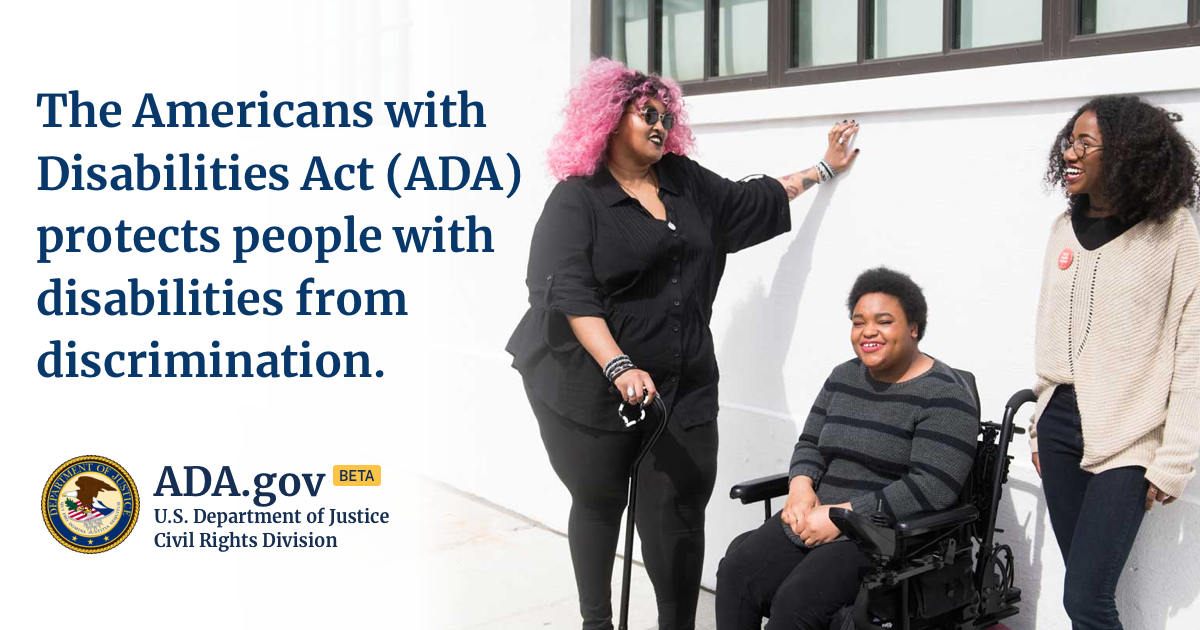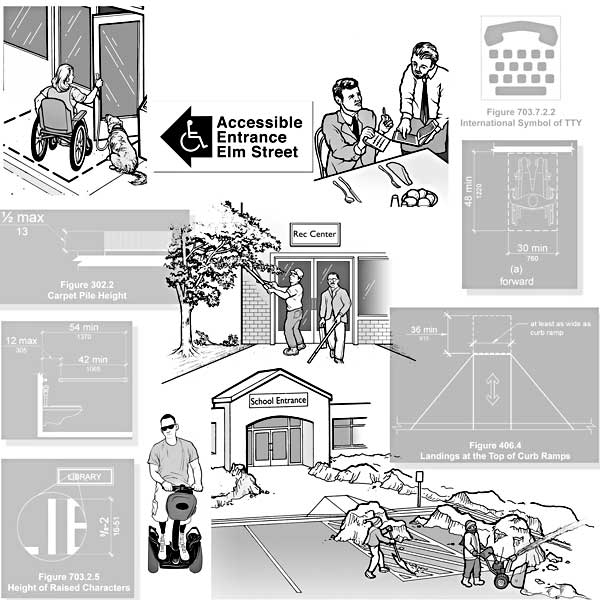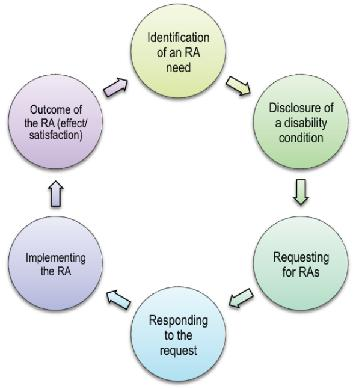
The Americans with Disabilities Act (ADA) is a federal law that protects the rights of people with disabilities by eliminating barriers to their participation in many aspects of living and working in America. The California Fair Employment and Housing Act (FEHA) is a California law that provides California disabled employees with additional legal protections. In particular, the FEHA prohibits covered employers from discriminating against people with disabilities in the full, broad range of employment-related activities, from recruitment to advancement, to pay and benefits.
Employers covered by FEHA can fire workers with disabilities under certain conditions:
A disabled employee who acts out in a sufficiently disruptive manner or threatens to harm themselves or others can still be fired, provided that similar behavior by other employees has resulted in the same response by the employer in the past.
Title I of the Americans with Disabilities Act of 1990 prohibits private employers, state and local governments, employment agencies and labor unions from discriminating against qualified individuals with disabilities in job application procedures, hiring, firing, advancement, compensation, job training, and other terms, conditions, and privileges of at will employment.
The ADA covers employers with 15 or more employees, including state and local governments. It also applies to employment agencies and to labor organizations. The ADA's nondiscrimination standards also apply to federal sector employees under section 501 of the Rehabilitation Act, as amended, and its implementing rules.
FEHA covers California employers with 5 or more employees, including public and private employers, labor organizations and employment agencies.
An individual with a disability is a person who:
Qualified disabled employees or applicants with a disability are individuals who, with or without reasonable accommodation, can perform the essential functions of the job in question.
A reasonable accommodation may include, but is not limited to:
Reasonable accommodations are intended to ensure that qualified individuals with disabilities have employment equal — not superior — to those of individuals without disabilities.

A reasonable accommodation is a modification to a job, work environment or the way work is performed that allows an individual with a disability to apply for a job, perform the essential functions of the job, and enjoy equal access to benefits available to other individuals in the workplace.
An employer is required to make a reasonable accommodation to the known disability of a qualified applicant or employee if it would not impose an "undue hardship" on the operation of the employer's business.
Accommodations vary depending upon the needs of the individual applicant or employee. Disabled people (or even all people with the same disability) will not all require the same accommodation.
An employer generally does not have to provide a reasonable accommodation unless an individual with a disability has asked for one. If an employer believes that a medical condition is causing a performance or conduct problem, it may ask the employee how to solve the problem and if the employee needs a reasonable accommodation.
Once an accommodation is requested, the employer and the individual should discuss the individual's needs and identify the appropriate accommodation. Where more than one accommodation would work, the employer may choose the one that is less costly or that is easier to provide.
Not all emotional, physical or mental impairment, are covered under the law. The FEHA applies to persons who have substantial, as distinct from minor, impairments, and that these must be impairments that limit major life activities such as seeing, hearing, speaking, walking, breathing, performing manual tasks, learning, caring for oneself, and working.
An individual with epilepsy, paralysis, a substantial hearing or visual impairment, a physical or mental impairment, or a learning disability would be covered, but an individual with a minor, nonchronic condition of short duration, such as a sprain, infection, or broken limb, generally would not be covered.
To be covered, the disability must restrict the employee from performing their various job duties.
Employers may not ask job applicants about the existence, nature, or severity of a disability. Applicants may be asked about their ability to perform specific job functions. A job offer may be conditioned on the results of a medical examination, but only if the examination is required for all entering employees in similar jobs. Medical examinations of employees must be job related and consistent with the employer's business needs.
Medical records are confidential. The basic rule is that with limited exceptions, employers must keep confidential any medical information they learn about an applicant or employee. Information can be confidential even if it contains no medical diagnosis or treatment course and even if it is not generated by a health care professional. For example, a disabled employee request for a reasonable accommodation would be considered medical information subject to confidentiality requirements.
Employers are permitted to expect employees with disabilities to perform essential functions of the job according to the non-discriminatory job performance standards expected of all employees. An employee with a disability must meet the same production standards, whether quantitative or qualitative, as a non-disabled employee in the same job.
Lowering or changing a production standard because an employee cannot meet it due to a disability is not considered a reasonable accommodation. FEHA does require that standards be “consistent with business necessity.”
Most jobs require that an employee perform both “essential functions” and “marginal functions.” The “essential functions” are the most important job duties, the critical elements that must be performed to achieve the objectives of the job. Removal of an essential function would fundamentally change a job. Marginal functions are those tasks or assignments that are tangential and not as important.
In the wrongful termination context, the question often arises whether absenteeism and failure to comply with the professional standards of the job may justify termination of the individual because they constitute “essential functions.”
Attendance is normally considered an essential function of the job if the employer has a standard absenteeism policy that is enforced uniformly. However, a leave of absence may also be considered a reasonable accommodation for a disabled employee.
On the one hand, attendance is an essential function of most jobs. On the other, allowing an employee to take some leave to recuperate might allow the employee to return to work at full strength more quickly. Ultimately, courts will look at your job duties, how much time off you needed, and how your employer has treated requests for time off from employees without disabilities, among other things.
The Family and Medical Leave Act (FMLA) applies to employers with 50 or more employee. The California Family Rights Act (CFRA) applies to California employers with 5 or more employees. Under these laws, eligible employees are entitled to take up to 12 weeks of unpaid leave in a 12-month period for certain qualifying reasons, including a serious health condition.
Employers frequently believe that an employee taking leave can never be terminated since they have CFRA rights to be reinstated to their same or equivalent position at the end of the leave. While it is true that this is a job-protected leave, it is also true that an employee on CFRA may still be terminated while on CFRA if the reason is not in retaliation for taking disability leave and is non-discriminatory.
If the employee has a confirmed disability recognized under the law and is otherwise qualified, the employer has a duty to engage in the interactive process to consider reasonable accommodations which might enable an employee with a disability to enjoy equal employment opportunities.
The employer may choose among reasonable accommodations as long as the chosen accommodation is effective.

As part of the interactive process, the employer may offer alternative suggestions for reasonable accommodations and discuss their effectiveness in removing the workplace barrier that is impeding the individual with a disability. If there are two possible reasonable accommodations, and one costs more or is more burdensome than the other, the employer may choose the less expensive or burdensome accommodation as long as it is effective.
An employer does not have an affirmative duty to provide an accommodation that would cause an “undue hardship” to the employer. A determination of undue hardship should be based on:
Although disability cases are decided on a case-by-case basis, the fact remains that if the employer can prove that it could not provide reasonable accommodation to enable the disabled person to do the job, then it is legally permissible to terminate.
California Fair Employment and Housing Act is enforced by the California Civil Right Department (CCRD), where complaints regarding disability discrimination may be filed.
Remedies may include hiring, reinstatement, back pay, court orders to stop disability discrimination, and reasonable accommodation. Compensatory damages may be awarded for wrongful termination in actual monetary losses and for future monetary losses, mental anguish, inconvenience, attorneys' fees and costs. Punitive damages may be available as well, if an employer acts with malice or reckless indifference.
It is also unlawful to retaliate against an individual for opposing employment practices that discriminate based on disability or for filing a discrimination charge, testifying, or participating in any way in an investigation, proceeding, or litigation under FEHA.
Employees have a legal right to bring legal claims against their employers if they have wrongfully terminated them due to a physical or mental condition. If you are facing legal action, you need the privileges of an attorney-client relationship from an attorney advertising a free consultation.
Freeburg & Granieri, APC offers free consultation to help you with your case.
Our clients become friends, confidants, and repeat customers. Former clients are our best referral source.
Do not be a commodity, find an attorney who treats your legal issue with the care it deserves.

